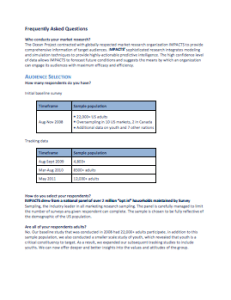Starting in 1998-1999 and continuing again from 2008-2015, The Ocean Project conducted cutting-edge public opinion and market research and provided extensive data, analysis, and recommendations to help zoos, aquariums, and museums (ZAMs) and our other partners strategically plan and implement their awareness and education programs, communications, marketing and other types of outreach programs for conservation action with their millions of visitors and the public.
We have been and always will be completely transparent and share our research, analysis and related information. Our blog contains much of the results of our collaborative work. Additionally, the research has been proactively spread throughout the conservation community, including private foundations, NGOs, government agencies and all included in our network of 2,000+ organizations in 180 countries so that the entire movement for our blue planet can benefit.
All our reports can be found here, free to download and use in helping advance your conservation mission. Our blog includes communications materials and case studies on effective visitor engagement.
Among the many findings, our research identified the importance of engaging youth and people from diverse backgrounds. The findings also clearly showed the high level of regard people have with ZAMs, as trusted messengers for guidance on environmental information and conservation action. In fact, the public expects ZAMs to provide solutions-oriented information. This unprecedented body of research – one of the largest such research projects ever conducted – provided our partner organizations with guidance and confidence to pursue their missions efficiently and effectively for conservation outcomes.
**** As a result of this unprecedented research, and after many years of co-developing campaigns for youth engagement with our ZAM partners, in 2022 we shifted our mission to focusing on supporting and empowering youth around the world to be stronger and resilient leaders. ****
Our blog has many examples of successful application of the research and continuing evolution of our collaborative campaign work with ZAMs and others across the United States and around the world. For the most updated information, please visit our World Ocean Day blog.
As part of our offerings, we keep a pulse on public sentiment as global events unfold and incorporate those findings into all our activities. We provide electronic updates of our activities (please sign up here) that you can can participate in, such as World Ocean Day and our work to support and empower youth.
Research History
The Ocean Project has a long track record of advancing ocean conservation by conducting innovative opinion and communications research to help ZAMs be more effective educators for action and communicators for conservation.
In 1999, The Ocean Project completed what was at the time the most comprehensive opinion research on public attitudes, perceptions, and knowledge of the ocean ever conducted. Communicating About Oceans: Results of a National Survey revealed the low level of public understanding of the ocean and the environment, and prompted ZAMs and others in the broader conservation community to rethink how they address these issues. The findings provided our Partners with valuable insights and helped ZAMs become more strategic in their efforts to reach their millions of visitors.
10 years later, The Ocean Project revisited that earlier research to design a study that would help the same organizations move beyond raising awareness to inspiring action and measuring outcomes. The resulting report, America, the Ocean, and Climate Change, has been made widely available for our partners and others to explore, learn from, and apply in their specific situations.
Most recently (2020) we published a report, Looking Back While Planning Ahead, updating the progress on application of the research and lessons learned from continual testing and evaluating of collaborative campaigns in partnership with ZAMs. We are currently scaling efforts, helping ZAMs become a stronger force for effective conservation.
Our communications research is helping ZAMs and others better understand the public, including not only who is most likely to take positive environmental action, but what needs to be conveyed to increase awareness and action for the ocean, climate change, and related environmental issues. We strive to help our partners communicate to build an ocean- and climate-literate public that is willing and motivated to take action for conservation. Indeed, people increasingly expect and appreciate it when ZAMs provide this type of information to help with solutions and help leaders for conservation in their communities and beyond.
Methodology FAQ
Our communications research consultants at IMPACTS Research use a combination of quantitative and qualitative methods to help us understand the market better. If you have any questions about the communications research, please see this Methodology FAQ:
To cite our research
Use the example below and change the publication name, dates, and URL to match the document you’re citing:
The Ocean Project. (2009, June). America, the Ocean, and Climate Change: Key Findings. Retrieved [date] from https://theoceanproject.org/reports

